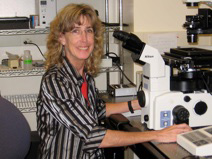Campus News
Biologist Susan Strome wins Ellison Medical Foundation grant
The Ellison Medical Foundation has selected biologist Susan Strome as a Senior Scholar in Aging, providing $600,000 over four years to support her research.

The Ellison Medical Foundation has selected Susan Strome, professor of molecular, cell, and developmental biology at UC Santa Cruz, as a Senior Scholar in Aging, providing $600,000 over four years to support her research on factors that extend the lifespan of organisms in the laboratory.
Strome’s lab studies the development of germ cells, the cells that give rise to eggs and sperm. Germ cells have unique characteristics, including “immortality” in the sense that they can give rise to generation after generation of offspring. The ordinary cells of the body, known as somatic cells, are subject to age-related changes not seen in germ cells. Strome is investigating the factors involved in germline immortality and whether they can be harnessed in somatic cells to help animals live longer.
For over 25 years, Strome’s lab has been studying germline cells in the nematode worm C. elegans. One of the unique features of germline cells that Strome discovered early in her career is the presence of “P granules,” complexes of proteins and RNA that are associated with pores in the membrane of the cell nucleus. Recent studies in another lab have shown that P-granule proteins are expressed in the somatic cells of mutant worms known to live twice as long as ordinary worms, and that depletion of those proteins reduces longevity. The Strome lab has identified other mutants with P-granule proteins in their somatic cells and has preliminary evidence that some of those mutants are also long-lived.
“We hypothesize that the presence of P granules in somatic cells protects their nuclear pores, slows the nuclear deterioration that normally occurs with age, and in that way extends lifespan,” Strome said. “We’re still in the early stages of this research. Our lab has focused for many years on understanding the essential elements of the germ line, especially the factors that endow germ cells with immortality. Now we want to apply our knowledge of germ cell biology to the area of aging.”
The Ellison Medical Foundation Senior Scholar in Aging program is designed to support established investigators who want to develop new research programs in aging. “The Ellison Medical Foundation is remarkable because they want to recruit senior scholars into aging research and they’re willing to fund early phases of aging-related projects. This funding will help us establish a solid foundation and develop findings that will make us competitive for funding from the National Institutes of Health,” Strome said.
The Ellison Medical Foundation supports basic biomedical research on aging relevant to understanding lifespan development processes and age-related diseases and disabilities. More information is available online at ellisonfoundation.org.